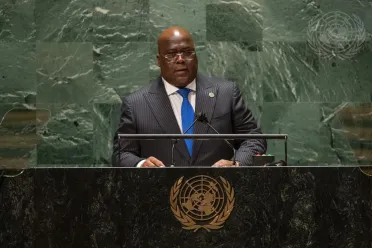Statement
Statement summary
FÉLIX ANTOINE TSHISEKEDI TSHILOMBO, President of the Democratic Republic of the Congo, emphasized the importance of global solidarity in the fight against COVID-19. African countries set up a joint continental strategy to address the pandemic, created a response fund and a platform for medical supplies. Through the African Vaccine Acquisition Trust, 220 million vaccine doses were purchased, he reported. The continued recurrence of the virus will continue unless there is increased testing capacity and vaccine distribution in countries that don’t have the necessary laboratory products to produce their own. The virus exacerbates the vulnerabilities of many poorer African countries, where the drop in economic activity has been keenly felt through job loss, education and decreased revenue. In that context, African economies need financing to recover, as internal efforts to cushion the blow of the pandemic have proved insufficient. While noting a fresh allocation from IMF of international drawing rights amounting to $33 billion, he said the funding was not enough and suggested that part of the reallocation could contribute to the capitol of the African Development Bank and could promote youth entrepreneurship in Africa.
Turning to global warming on the continent, 2030 could be marked by a decrease in GDP and a sharp increase in flooding and other detrimental climate affects, he warned. Africa will require $30 billion per year to adapt to those challenges, a figure that is set to increase to $50 billion by 2040. “Africa does not need charity,” but constructive win-win partnerships to make better use of its collective national wealth and improve the living conditions of its people.
Development requires strong, stable, democratic institutions, he stressed. Globally, substantial progress has been made in terms of consolidating democratic systems, but the scourge of insecurity caused by terrorist groups imperils the stability of new democracies in Africa. The global fight against Da’esh has achieved victories elsewhere in the world, but affiliates of the group continue to gain ground in Africa. Kinshasa will actively participate in eradicating terrorism by working with African partners, he said. International peace and security are broadly dependent on Member States’ stability, he observed, stressing that it is the duty of the United Nations to actively support them, beyond statements of compassion. If the Organization fails to find an effective strategy to combat insecurity in Africa, open wounds in the Sahara region will metastasize until they become a real threat to international peace and security. He went on to call for a global counter-terrorism strategy, specific security policy, pooling of security resources and sharing of information amongst States. As for prevention, a socioeconomic approach must be promoted. In that context, the establishment of the African Continental Free Trade Area stems from a desire of Africans to build on their independence.
The political crises in some countries should not diminish the progress made towards democratization in Africa, he continued. His Government undertook reforms and institutional changes in 2020 and 2021, and with assistance from IMF and the World Bank, will carry out social and infrastructure projects. As a result, inflation has decreased and the currency stabilized. However, the lack of security in the northern region of the country threatens to hamper its achievements. As such, he announced he would proclaim a state of emergency in the Democratic Republic of the Congo. Important progress has already been made on that front, with the elimination of several hundred militia, weapons and ammunition seizures and arms trafficking networks dismantled. Hostages have been released and major roads have been reopened. In that context, it is crucial that the application of sanctions measures be lifted so the Government can freely secure their own territory.
He went on to call for an orderly and gradual withdrawal of the United Nations Organization Stabilization Mission in the Democratic Republic of the Congo (MONUSCO). To that end, a Democratic Republic of the Congo-MONUSCO joint commission has been established to define the strategy and to draft the road map for the eventual withdrawal. The Mission’s transition will expire in 2024, and the United Nations and Security Council must provide it all necessary resources to fulfil its mandate.
Full statement
Read the full statement, in PDF format.
Photo

Previous sessions
Access the statements from previous sessions.
